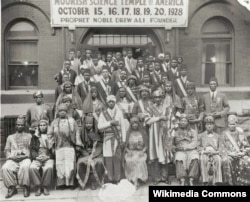The Baton Rouge police shooting has focused attention on a little-known political movement that U.S. law enforcement officials say poses a growing threat.
Gavin Long, the former Marine who killed three police officers Sunday, claimed to be a member of the United Washitaw de Dugdahmoundyah Mu’ur Nation, a "sovereign citizen" extremist group whose supporters are black, but whose ideology, ironically, draws from a white supremacist movement of the 1960s.
"The sovereign citizen movement consists of about 300,000 people," said Mark Potok, senior Fellow at the Southern Poverty Law Center. "The vast majority are not members of specific groups, and they've been growing in a huge way since 2008, when Barack Obama was elected president."
Sovereign citizens share a common belief the U.S. government is not legitimate, and while they may reside in the United States, they claim to be "sovereign" and thus outside the jurisdiction of state and federal laws. This means they boycott holding Social Security cards, paying taxes, carrying driver's licenses or paying traffic tickets. They reject federal courts and instead fight legal battles in their own “common law" courts.
"What's interesting today is that the initial ideology that was cooked up in the 1960s was basically anti-black," said Potok. "Today, we see groups like the Washitaw Nation, which appeal to black Americans."
The United Washitaw de Dugdahmoundyah Mu’ur Nation, a group that Potok believes is relatively small, maintains that American blacks are descended from ancient Moroccans who settled the continental United States long before the arrival of European settlers. As “indigenous” citizens, they also see themselves as exempt from U.S. law.
“Sovereign citizen ideology is syncretic, which means it is a melding of beliefs from different sources,” explained J.M. Berger, a fellow with George Washington University's Program on Extremism and an associate fellow with the International Centre for Counter-Terrorism in The Hague. “So the ideological elements have been around for a long time.”
So which came first, resentment of the government or the movement’s conspiracy theories?
“I don't think you can answer the chicken-and-egg question for the sovereign movement per se, but certainly for one of its important predecessors, Posse Comitatus, the grievances seem to precede the theories,” said Berger.
Posse Comitatus, Latin for “power of the county,” was a right-wing extremist group founded around 1970. The group used a convoluted interpretation of the Christian Bible to support its anti-Semitic, anti-government views.
“Not everyone is drawn into sovereign beliefs out of resentment of the government,” said Berger. “Some are drawn in by the promise of relief from financial stress or legal problems. In the case of 'Moorish' sovereigns, there is also a racial pride component to its appeal.”
Threat of violence
Traditionally, sovereign citizens were little more than a nuisance, committing petty offenses such as driving without licenses or white-collar crimes, that is, selling fraudulent driver's licenses, car registrations, passports or gun permits to fellow sovereign citizens.
Lawyers have long complained that sovereign citizens congest the court system with endless and frivolous lawsuits against everything from parking tickets to dog licenses.
But today, according to the FBI, they pose an increasing threat to U.S. security. In May 2010, for example, father and son Jerry and Joe Kane shot and killed police officers during a routine traffic stop in West Memphis, Arkansas.
“Most sovereigns are not violent,” Berger clarified. “When it does happen, sovereign violence has historically been very personal, mostly occurring while resisting arrest.”
Bergen said it’s not clear whether Gavin Long was acting on his sovereign beliefs or his anger over police violence when he ambushed police officers in Baton Rouge, Louisiana.
“I would say we don't fully understand the dynamics of why and how the sovereign movement inspires violence,” he said, “Like most things in life, it's complicated.”












